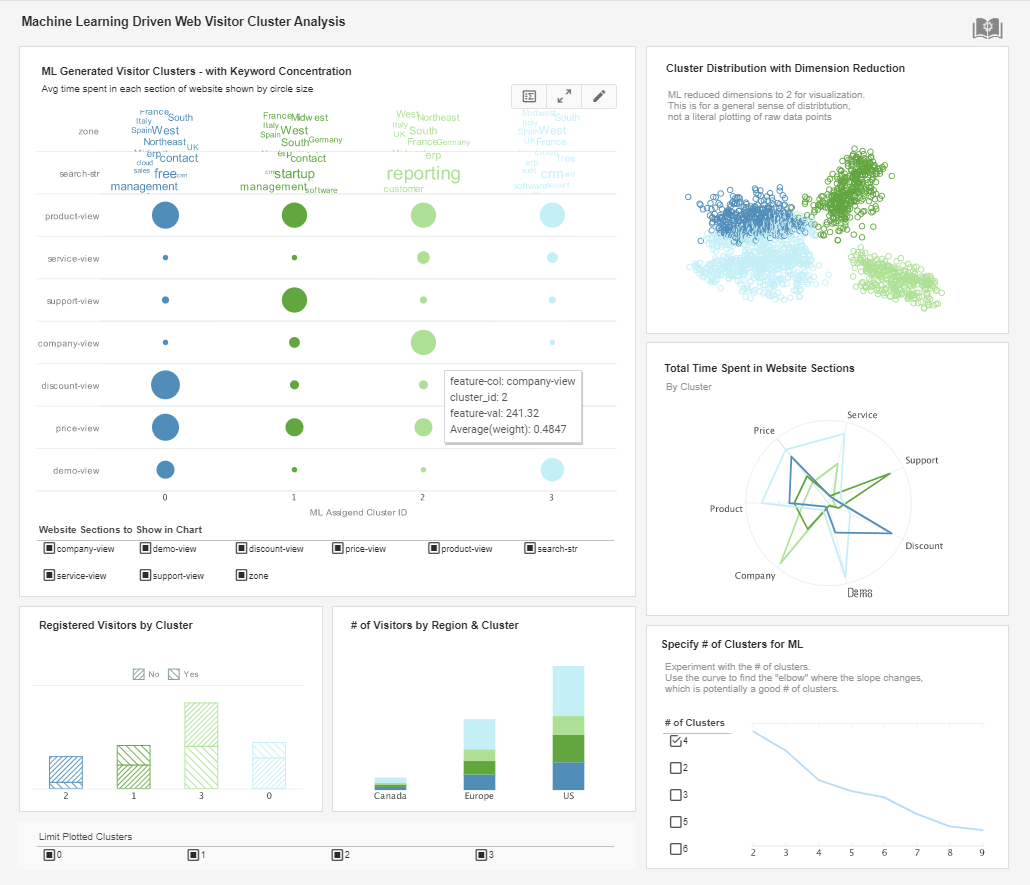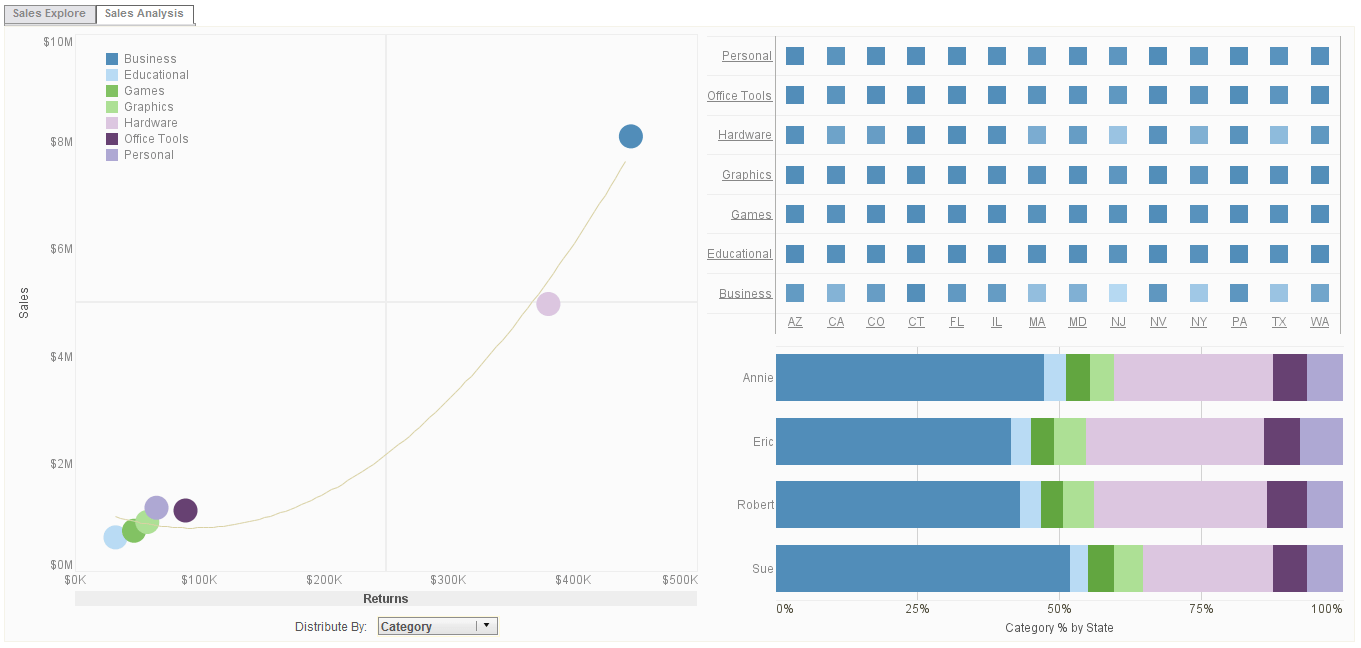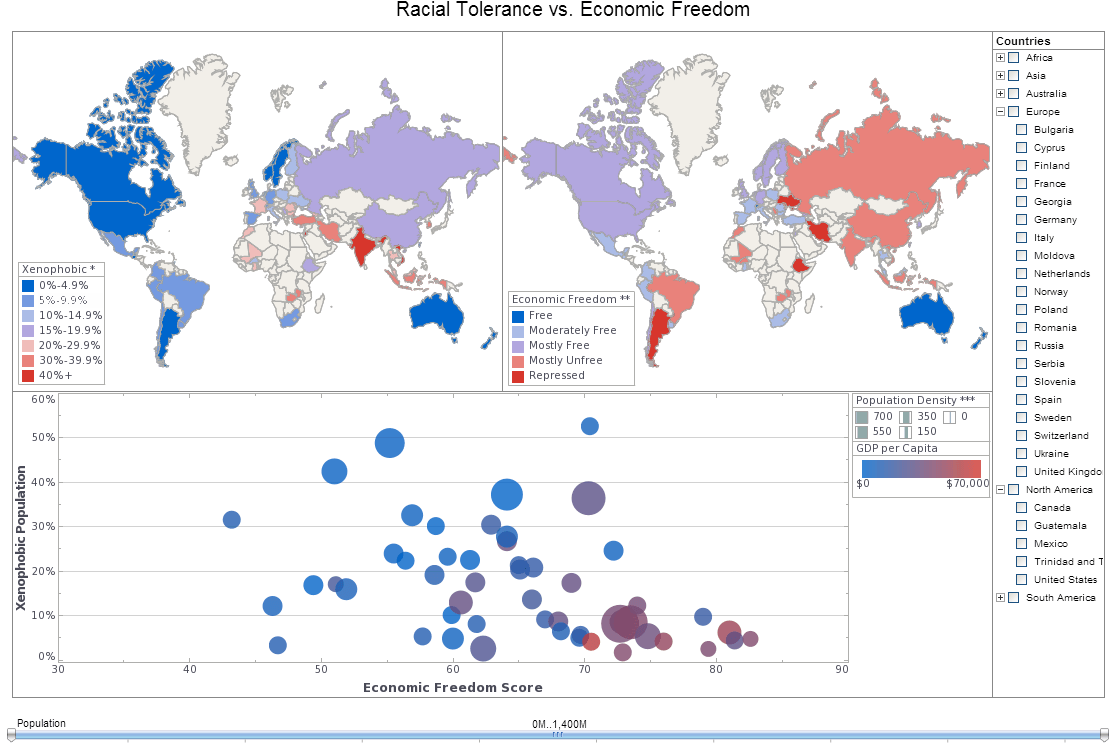Data Science Vs. Business Intelligence
Researching the difference of data science vs business intelligence? InetSoft's data science functions are built into its industry pioneering BI platform. Read articles about its capabilities and Request a Demo.
Greatest Data Scientist in the World - There's hope for me. I got a bachelors in economic ages ago and built some crude statistical models with the tools that were available back in the 80s. But I don't think I will be the greatest data scientist in the modern world. I think people who are 20 years younger than me are probably are more adept. I blogged recently about some of the key components of a data science curriculum. One of those was paradigms and practices. While you don't necessarily need a bachelor degree, you want to know what the heck is going on. What does paradigms and practices mean? What does that entail? It means first and foremost that you understand the core function of what a data scientist is. You're not doing business intelligence because business intelligence is more about routine performance tracking. An analyst is looking for the patterns in the data set that are non obvious...

Healthcare Data Science Platform - Okay, so we have a sense of your healthcare data science platform. The challenges, let's talk a little bit about how you now take this and apply it to the problem that your healthcare sector clients have. What are you doing in terms of being able to create recommendations to make healthcare data solutions available, and the speed, how does that factor. So I guess I'm trying to get to what are the requirements that people have that exploit the technology that you put in place when it comes at being actionable. Sure, so let's start from the user's perspective, and then I'll work a little bit backwards more towards the technology. From a user perspective, people involved in any intelligence environment where you're trying to figure out whether some behavior was good or bad. They're just inundated with lots of little questions, and the longer that those little questions take to answer the harder their job is to get it done. So what we provide by leveraging the column store technology in Vertica is the ability to rapidly cycle through data and do measurements in an interactive fashion and the column stores provide very, very fast answers, and so we can let people filter data down and get new metric calculations on the fly, and this allows them to essentially self serve by getting answers to questions. So we allow the users to filter data, and as they filter their data they get new measurements, and new metrics coming back on a very, very rapid fashion. That allows them to answer questions very, very fast, and they don't lose the context...
Healthcare Industry and Data Science - So what's been the common thread from cyber security to healthcare in terms of analytics and data science? What are the technical and other hurdles that are common between them that allowed you to make that leap? So the ability to detect various kinds of events in your data streams, and I'm going to use that term somewhat loosely, detecting events and data streams and then combining them together into patterns is something that happens in cyber security as well as fraud, waste and abuse. So whether you do that by looking at a series of bad claims or a series of services that shouldn't have occurred in sequence is a simple idea. We can't pull a tooth from a baby. That's a great example of a very simple idea, that sequence of events shouldn't be happening in healthcare, and you can see in a series of network activity the same kinds of events in principle would occur as a series of patterns and as you get good at detecting those kinds of patterns you can apply the same skill and learning about how to deal with the 3Vs of big data, the variety and the velocity and whatnot to really harness this in very high speed fashion. Right, now not that the cyber security issues aren't important, but are the stakes higher for healthcare, or is the market larger? What's at stake when you point your technology and expertise at the healthcare sector...
History of Data Science - Is data science new? To me this is resounding no. In fact, machine learning has been studied at least since the 1950s, maybe before. Data science you could say goes back to John Tukey's 1962 Future of Data Analysis Paper. There's a great recent paper by David Donoho out of Stanford that talks about 50 years of history of data science, and I urge you to read that. We have a link to that at the end. We're seeing machine learning in organizations now. This isn't coming out of the blue. This has a long history, and so we wanted to spend a little bit of time here. One good thing to do at first is of course to define machine learning, and that's really tricky. I think for better or for worse, in a certain sense machine learning has taken on sort of a pop culture, meaning it's just the rebranding of analytics or data mining...
How AI Technologies Can Help the Healthcare Industry - Artificial intelligence (AI) is integral to almost all functions of the healthcare industry covering everything from research and healthcare reporting to predictive analytics for clinical decisions. The role of AI in the healthcare industry is gaining prominence as technology advances and its effect on quality and service delivery is immense. Machines in hospitals, laboratories, and pharmaceutical factories can perform tasks previously done by human labor faster, with precision, and at a fraction of the cost. Here is a brief look at some of the areas AI technologies will improve in healthcare...
How is Your Data Science Solution Supporting That - Right, well suffice to say it certainly sounds like you've been able to compress the time between analytics question and answer. This isn't a long term batch issue, and that allows investigation to take place where one answer to a question leads to the next question, and you can't get there rapidly without that process. So tell me a little bit about speed, not just speed of data but speed of investigation. How is your data science solution supporting that? So one of the most difficult things to do it in investigation is if you imagine a dataset of a billion services, and that's a pretty good number of services. What I mean by service is when you go to the doctor, and they do a procedure, that's typically called a service, and when you have giant dataset of a billion or more of these services your job is to go figure out today which ten are bad. That's a classic needle in a haystack. So what we've done is provided a risk management framework over the top of that where we have advance sensors in our data science platform that go and look for all these combinations of bad behaviors up in mass, and the analytics will run these things very, very fast, and they supply up all of the services which are highly questionable. When we take the services that are highly questionable, and we run them through our risk framework to allow our calculation of what providers are engaging in the riskiest behaviors then how do they rank relative to other providers who maybe doing the same kinds of behaviors...


Reporting Visualization Tool for Data Science - Looking for a good reporting visualization tools for data science? InetSoft is pioneering BI platform offers analytics for ML models built in Spark. View a demo and try interactive examples...
Training the Next Generation of Data Scientists - Should we be teaching coding in high schools? I don't know. It's a very good question to end the debate with. I do think we're going to have to think about new ways of training the next generation of data scientist. Then you have to be creative in doing that. Only time is going to tell how important it is for a data science to be a real machine learning expert, or how important is it for a data scientist to know more about business. Only time is going to tell what's more important. I think we'll see continued specialization of data science and data visualization, machine learning experts, data engineers, that's my prediction. But as we know, making predictions is a dangerous game in the technology industry...
Using AI in Education - As the modern-day classroom becomes even more modern with the use of machine learning, AI has spawned a debate on whether this move would benefit everyone or not. First, consider the students: Will they be treated fairly with AI? Or, will AI still be influenced by bias, and be vulnerable to technical flaws. As for teachers, can AI be an effective teaching tool? Or, will AI rob teachers of their ability to teach? With so many questions about AI being used in schools, we would have to consider both sides of the argument: the pros and the cons...
Using Specialized Data Science Tools - Machine learning extracts information from data that is not apparent to even experienced business users. Data scientists normally spearhead this process using specialized data science tools such as Python and R, but Business users are most times limited to static ML output and reports. InetSoft changes that. InetSoft's data intelligence software productionalizes machine learning. It provides visual tools that directly tap into machine learning business applications. Business users can not only visually analyze machine learning results but also train machine learning models with sliced-and-diced data. When data grows beyond an experimental machine learning setup, InetSoft's native Apache Spark based platform can easily scale on demand. It can utilize an external Spark Cluster or build its own with minimal Spark expertise...


